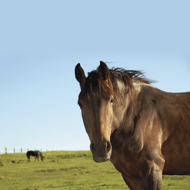New laminitis projects planned for 2015

Laminitis is estimated to affect around 15 per cent of UK horses and ponies.
Two new PhD projects will explore predisposition to pasture-associated laminitis and the impact of diet on the condition.
Obesity is a growing problem, with some studies suggesting as many as 50 per cent of UK leisure horses and ponies are obese. Meanwhile, laminitis is thought to affect around 15 per cent.
Fat accumulation in horses has been increased by improved nutrition and decreased workloads. As a result, there is greater demand for improved nutritional advice for senior (over the age of 20) and obese animals.
New research in 2015 will aim to assess the impact of diet on the microbiota of these animals.
Under the supervision of Professor Caroline Argo from the University of Surrey, researchers from the University of Liverpool Equine Hospital and the University of Aberystwyth will also consider how their findings could be used to improve advice on the feeding and management of horses.
A further study on pasture-associated laminitis will take place at the Royal Veterinary College. Under the supervision of Dr Nicola Menzies-Gow and Professor Jonathan Elliott, the research team will continue current work to determine which individual horses and ponies are at most risk of developing pasture-associated laminitis.



 The RCVS has announced a new version of its 1CPD mobile app, with enhanced features for veterinary surgeons and veterinary nurses to record their continuing professional development.
The RCVS has announced a new version of its 1CPD mobile app, with enhanced features for veterinary surgeons and veterinary nurses to record their continuing professional development.